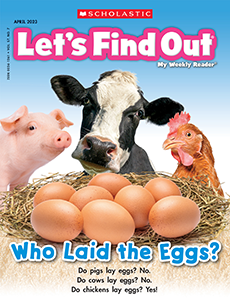Academic Standards
Learning Objective:
Children will compare and contrast two nocturnal animals.
Science Focus:
nocturnal animals
Page 4 Skill:
read a chart
Vocabulary:
nocturnal, grub, insect
CCSS (and states that have similar standards):
RI.K.1 key details, RI.K.4 vocabulary, RI.K.3 compare and contrast, RF.K.2.A rhyming words, RL.K.1 key details (literature), SL.K.1 collaborative discussions, SL.K.2 confirm understanding by answering questions
Watch the video
Watch the video
Build background knowledge about nocturnal animals by watching “Creatures of the Night.” When you’re done watching, ask the following question: Why do some animals stay awake at night?
Preview new vocabulary words
Preview new vocabulary words
Preview new vocabulary words. Project the online vocabulary slideshow and introduce this issue’s featured words.
Set a purpose for reading
Set a purpose for reading
- Have students do a picture walk through the issue. Then read and discuss the cover.
- Then, before turning to page 2, say, “As we read the article, think about how aye-ayes and bats are alike and different.”
- Read “Aye-Aye at Night,” stopping at the end to check comprehension. Do the same for “Bat at Night.”
- Next, read the horizontally adjacent texts so students can focus on comparing and contrasting. After reading each set of texts, ask students how the animals are alike and similar. Record their responses on chart paper.
- When you’re done reading, have a vote to see which animal students think is cooler!
- Complete the page 4 activity as a group or individually.
- When you’re done reading, do the Dance Break!
- Show What You Know (skill: comprehension)
- Color the Aye-Aye (skill: writing and coloring)
Play the online game: What Rhymes With Bat?
(skill: rhyming words)
Complete a hands-on activity: Aye-Ayes and Bats
Children complete a Venn diagram to show how aye-ayes and bats are alike and different. (skill: compare and contrast)
Read a paired text: Night Animals
In Night Animals by Gianna Marino, a possum and his friends are afraid of the night animals they hear in the dark . . . until they realize they are the night animals!
